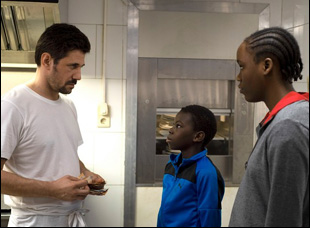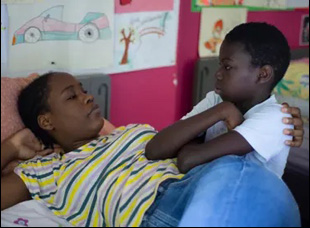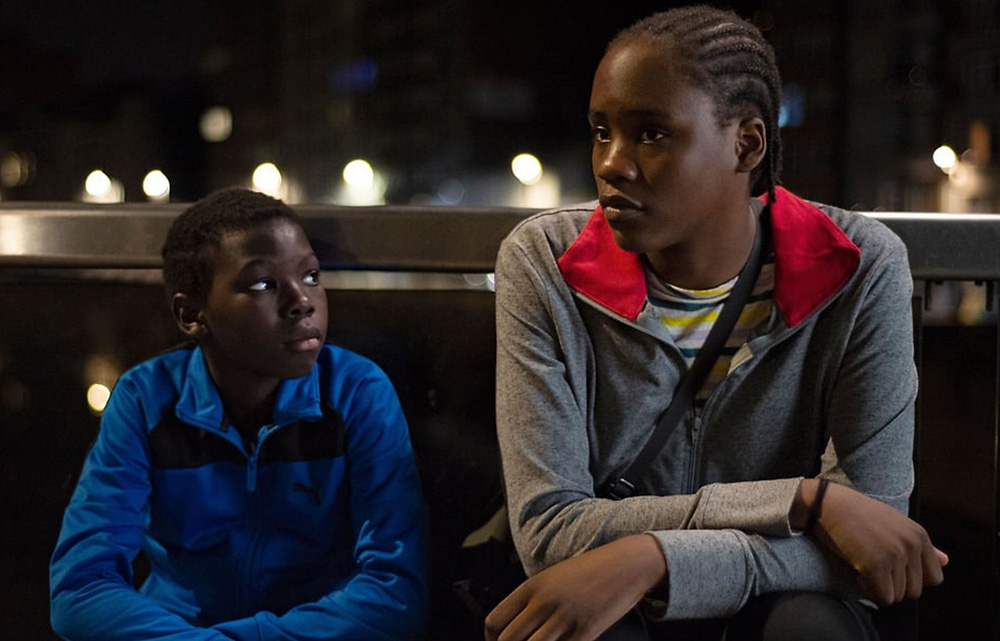Over a long and storied career, Jean-Pierre and Luc Dardenne have turned the most unnatural part of moviemaking into the strongest reflection of reality, abruptly seguing from one scene to the next as a reminder of the unsparing nature of time. In “Tori and Lokita,” the cuts seem particularly deep when they relate to the young refugees at its center (played by Pablo Schils and Joely Mbundu), siblings in spirit if not by blood who have helped one another brave a new life in Belgium together after fleeing Africa, though by no means have they been allowed to settle. They may be introduced singing at an Italian restaurant, but it turns out to be one job among others – one that pays mostly in free focaccia – they must hold on to stay afloat, with Lokita still sending money back home to her mother and on the hook for payments to the smugglers that helped her into the country. In the brothers’ frequent setting of Seraing, they aren’t the only ones to have second jobs these days when the cook (Alban Ukaj) at the cafe makes an offer to Lokita to make an extra bit of cash tending to an illicit marijuana grow house, though it comes with the unmentioned catch that she’ll will be separated from Tori with no way of contacting him once inside for fear of drawing the attention of the police.
Tori’s subsequent efforts to reconnect are hardly the only thing that becomes undeniable in the ferocious drama, which sees the Dardennes working at the height of their powers. Prescient observers of those who have fallen through the cracks of society throughout their career, the filmmakers have taken their gifts for propulsive action and turned it into a sense of urgency around the issues raised by ongoing migrant crisis that have left so many feeling as if they’ll never find home again in recent films such as “The Unknown Girl” and “Young Ahmed.” “Tori and Lokita” exudes the ingenuity required by its characters simply to make it through an average day in a place where they are made to feel unwanted, let alone evading the bad actors eager to prey upon their vulnerability, and with Schils and Mbundu making for quite the dynamic duo, the film becomes a force to be reckoned with alongside its characters.
While in the U.S. for retrospectives of their work in both New York and Los Angeles (where the series continues through April 11th, with rarely screened early films such as “Falsch” and “I’m Thinking of You” set to play the Los Feliz 3 on April 2nd and 6th, respectively), the brothers looked spry as ever as they spoke about – and would often act out – how important movement is to building up characters with their cast, adapting to the situation at hand and why immigrants have become a central focus of their work.

Jean-Pierre Dardenne: Without a doubt, because if there is one fundamental question today, in our eyes, the first is the migrants and when you ask that question, what it reveals is who are we as a society? How do we either accept and integrate or reject immigrants in our society? That’s the question. And it’s not the first time, because [immigration] was a big focus of “Lorna,” and in “La Promesse,” in which one of the characters had immigrated from Africa, but here in “Tori and Lokita,” it goes into the current situation for immigrants and the new forms of slavery. But here they are really at the center of the film — how they manage, thanks to their friendship, to overcome the obstacles they face — and
Luc Dardenne: The challenge and the goal of the film is to make Tori and Lokita real human beings, and we get invested into their story, not to use them as symbols of something else or to tell the biggest story. It’s just two individuals that we learn to know through the film.
Luc, you’ve called this an adventure, which it absolutely is, but may not be the first thing to come to mind when trying to describe it. How did it take that shape?
Luc Dardenne: We saw character of Tori, the little boy, we saw him as the character of an adventure film. He goes through obstacles and manages to find solutions to overcome them, to jump over them, to go under them, like when he flips on the bed in the opening scene, it’s an illustration of that. He’s always thinking about things and of course, he goes into the belly of the beast — into the plantation, he manages to get out. And Lokita is kind of a character from a noir genre [where] there’s the woman, there’s murder, [and she’s told] “you betray us, we’ll kill you.” She’s the one who endures the consequences much more than him who’s able to get around things and more than himself, [when] he jumps, he lifts Lokita.

Jean-Pierre Dardenne: We chose Pablo because we were looking for someone who represented this energy, but it’s true that Pablo gave [the character] his own energy. Physically, Pablo was ideal. He was one of the last we met [in auditions] — about a hundred actors were considered for [Tori] and about a hundred young women for the role of Lokita, and in Pablo’s case, he did have that energy [we were looking for], but he made [the character] his own and brought so much more than what we even expected in terms of that movement and fluidity.
When you saw his dynamic with Joely, did it change ideas you had about the characters?
Jean-Pierre Dardenne: First, we had to create their interaction because they didn’t know each other and during the rehearsals before the shooting, we worked 4-5 weeks with all the actors on the sets, with Luc and [myself] and our camera, and we had to create this friendship that is translated into gestures and looks. The first scene, for example, we rehearsed a lot to create a physical proximity between them. Then something we hadn’t anticipated and that gave us good ideas for the relationship was that Pablo is 12 years old, and we had forgotten that boys at that age, there is resistance to girls that are older [with more mature bodies]. And from there, things were invented. For example, in the first scene, when they chase each other in the bedroom, there is a moment of pause where [Tori] is resting his body on Lokita’s and how we wrote it, they were supposed to be on top of each other, but that wasn’t possible because of this resistance, so the blocking of it became different and more true, which is something we had to learn. During that [rehearsal] period, they had to get used to each other physically and have a sense of intimacy and a rapport.
Luc Dardenne: Also, [during one of the scenes in the hangar], when [Tori] crawls through [to see] Lokita and they’re reunited, normally we would say, “You embrace each other,” and the camera would stay on this side and we could see their legs, their bodies. And then he said, “No, I don’t want to touch her like that. Why don’t we do a fist bump?” We said, “Yes, good idea, let’s see,” and in that shot, you see her face light up and with a smile and it captured everything.

Luc Dardenne: When we say we do repetitions of four or five weeks, we repeat with a video camera on the actual [places] we shoot in. That’s where we find the movements and the actors’ dialogue. “Wait, go a little faster, or go slower, count to five before you leave.” That’s where we find the rhythm and the length of the shots too. I’m not saying we’re going to repeat that mechanically during the shoot, but we [then] have our basis and the essential choreography. It’s not intuitive, even if the cameraman brings his intuition to the film.
Is it interesting bringing back Alban, an actor familiar with your process, to work with actors like Pablo and Joely, who are new to it?
Luc Dardenne: We like to work with people we’ve worked with, but only if it’s the right fit and Alban, who plays Bettim [in “Tori and Lokita”], became a friend after “Lorna’s Silence” and it seemed to us that Alban [wasn’t an obvious] bad guy. He had a certain presence, and he agreed to learn French because he didn’t speak French and he learned the kitchen [to play a chef]. But he comes from Sarajevo and he was learning the French, but [the chef] to coach him for the cooking was an Italian from Sicily who spoke no English so really the only common language they had was the movement, which was good.
Jean-Pierrre Dardenne: The little French Alban had didn’t correspond to the French used by our Italian friend because he speaks a mix of French and Italian, so it was a real Tower of Babel and we had to get somebody from the production design team to help out and do all the translating.
What it was like to either create or find the hangar for that marijuana grow house?
Jean-Pierre Dardenne: It’s the first time since we’ve been making cinema that we’ve built a set. We got the documentation to build this hangar from the police [because] we know one of the people in charge of the anti-drug fight in Belgium, and he explained to us how these places were built.
Was there anything that happened you may not have expected but made it into the film and you really like about it?
Jean-Pierre Dardenne: We make long shots, and we [film] several takes, so there is always something unexpected. It’s all in the small unexpected things, but the details are what count. [During the shoot, however] what was unexpected was that [Pablo] broke his thumb either while playing basketball or high jump at his home on the weekend — he is a champion high jumper in his category in Belgium — so we had to shoot with [him wearing a small cast] on his hand and luckily it was when we were shooting the night-time scenes, so I think the spectator never learns. But it was a bit complicated.
Luc Dardenne: Yeah, he was good. He became so important because everyone was paying attention to him and making sure he was okay.
I’ve seen the film twice, I have not noticed the cast.
Jean-Pierre Dardenne: Next time, next time. [laughs]
You’re here in Los Angeles for a retrospective on the back of one in New York. Are these interesting as far as being able to reflect on your past work?
Jean-Pierre Dardenne: For us, it’s a great experience to see the film retrospectives in New York and Los Angeles because they’re important to cinema and to see these films that were made 15, 20 years ago still engage with people today. And after the screenings, people come up to us and talk, so we have this communication or dialogue with today’s generation and [feel] our work that we never anticipated that far back is still alive and connecting with people. For us, it is a great and strange experience because it’s like a premiere [for an older film] 20 years later. At one of the screenings in Los Angeles, when the [moderator] asked the audience, “Who has seen La Promesse?” There were new viewers. It’s really great.
“Tori and Lokita” is now playing at the IFC Center in New York and opens on March 31st in Los Angeles at the Monica Film Center, the Laemmle Glendale and the Encino Town Center, San Diego at the Hillcrest Cinemas and San Francisco at the Opera Plaza Cinema. It will open on April 7th in Portland at the Living Room Theaters and Chicago at the Music Box Theatre and on April 14th at the Belcourt Theatre in Nashville and April 21st at the Gateway Film Center in Columbus, Ohio.




